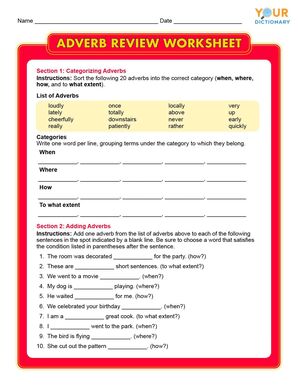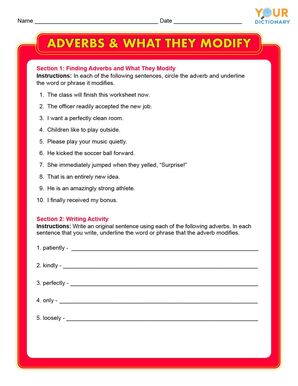

Mastering adverbs is an important part of elementary school English instruction. These lessons introduce adverbs and include independent activities for the students. Students will learn that adverbs modify verbs, adverbs and adjectives by telling how, when, where, and to what extent. Build a solid plan using these adverb grade 4 lessons.
Adverb Lesson 1: Adverb Review
This first lesson is a review of adverbs and their function. It starts with a board activity and ends with a printable worksheet for individual practice.
Board Activity
The board activity entails sorting adverbs into categories and explaining in what ways they modify words.
- Explain that adverbs change or add to the meaning of verbs, other adverbs and adjectives.
- Make four columns on the board with these headings: when, where, how, to what extent.
- Call out adverbs from these adverbs: tomorrow, there, lazily, too, outside, secretly, yesterday, extremely, soon, somewhat, carefully, close, now, much, forward, slowly.
- Ask students to tell you which column each word belongs in, filling in correct choices as the class discussion progresses.
The completed list should look like this:
- when - tomorrow, yesterday, soon, now
- where - there, outside, close, forward
- how - lazily, secretly, carefully, slowly
- to what extent - too, extremely, somewhat, much
Guided Exercise: Adverb Identification
Next, write these four sentences on the board. Have the class identify the adverb in each and tell what category it is from. The answers are in parentheses after the sentences.
- He swam quickly and won the meet. (quickly - how)
- I will be there soon. (soon - when)
- Come inside for dinner. (inside - where)
- She is somewhat annoyed. (somewhat - to what extent)
Adverb Review Worksheet
For a printable worksheet, click the image below. This worksheet requires students to categorize adverbs and add adverbs to sentences.

Adverb Lesson 2: Identifying the Adverb and What It Modifies
This lesson is designed to reinforce what students have learned and practice their adverb skills. They will demonstrate their understanding of adverbs by identifying them and the word or words they modify.
Adverb Grade 4 Content Overview
Clarify the meaning of an adverb, reviewing basic facts about adverbs.
- Review what adverbs modify: verbs, adverbs, and adjectives.
- Go over the categories of adverbs: how, when, where, and to what extent.
- Have students share examples of each category of adverb.
- Use what they share to generate a good list of adverbs on the board.
Guided Practice
Write these sentences on the board and have the students identify the adverb and tell what word it modifies.
- The message was secretly hidden in the book. (secretly - was hidden)
- The chores will be done tomorrow. (tomorrow - will be done)
- Why don't you sit here in this nice chair? (here - sit)
- I was extremely tired after my workout. (extremely - tired)
Practice Identifying Adverbs and What They Modify
Assign students to complete these practice questions. You can write the questions on the board and lead a discussion, or download the printable below as a worksheet for students to complete.
The goal here is for students to identify the adverb and the word or phrase it modifies. The answers are in parentheses, with the adverb listed first, followed by the word it modifies.
- The class will finish this worksheet now. (now - will finish)
- The officer readily accepted the new job. (readily - accepted)
- I want a perfectly clean room. (perfectly - clean)
- Children like to play outside. (outside - play)
- Please play your music quietly. (quietly - play)
Printable Adverb Identification Worksheet
For a printable version of the above activity that students can mark by circling adverbs and underlining the words or phrases they modify, click the image below. The printable also includes a sentence writing activity that uses specific adverbs.

Adverb review worksheet
Click to View & DownloadBuilding on Adverb Skills
The time you spend reviewing adverb knowledge and skills with fourth graders will reinforce earlier learning and lay the foundation for a lifetime of strong grammar and writing skills. To expand your lesson even further, consider introducing some examples of adverb clauses. You may also find this list of 100 adverbs helpful.